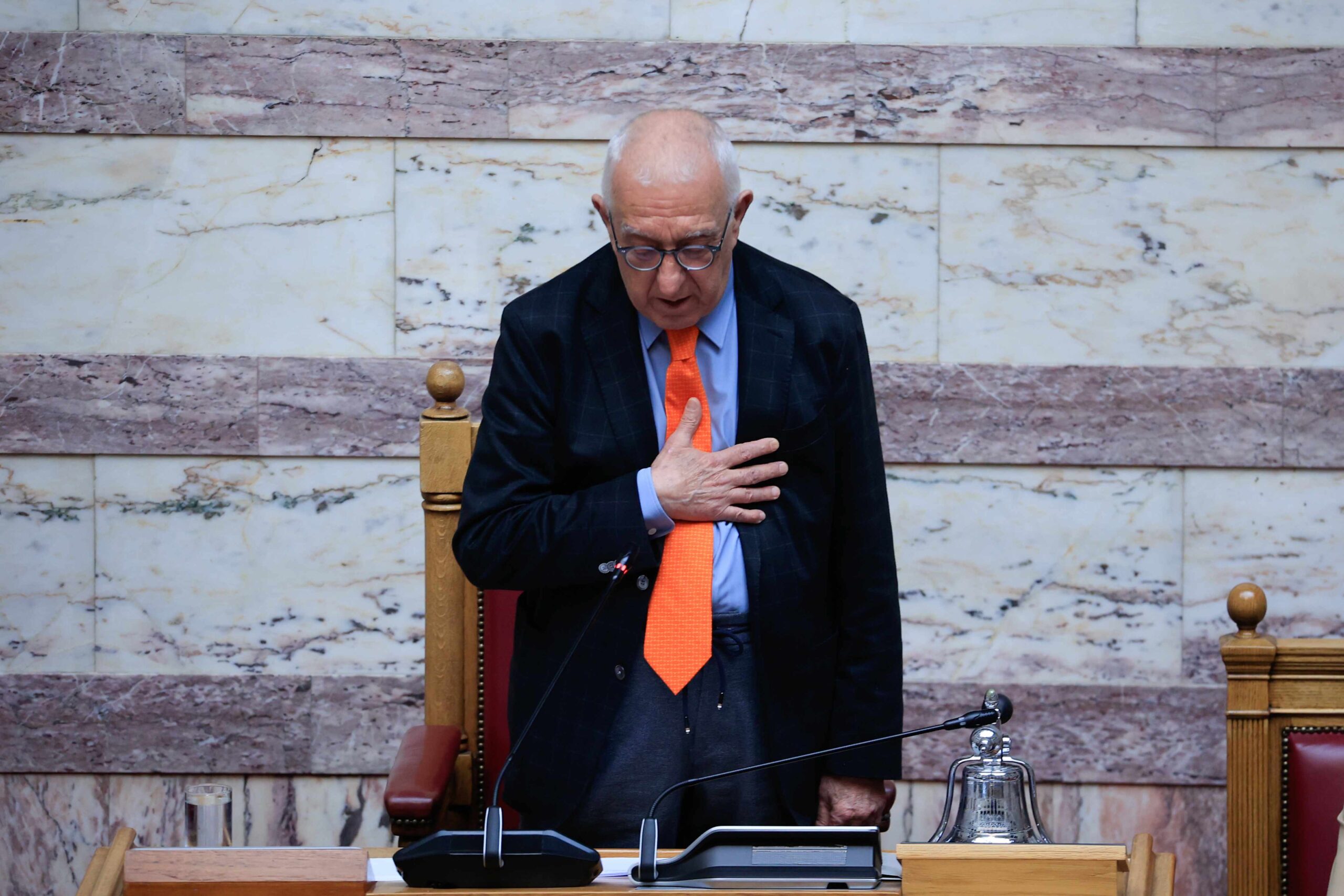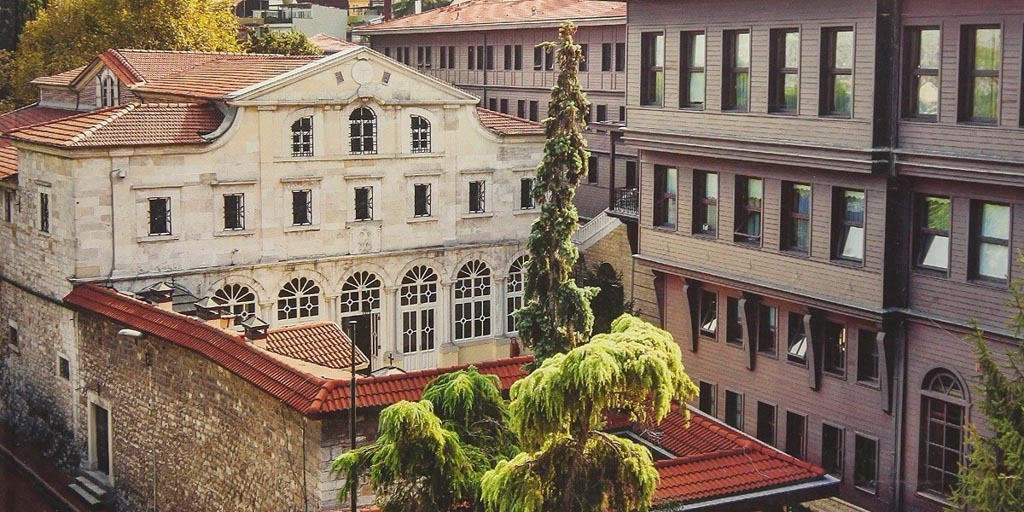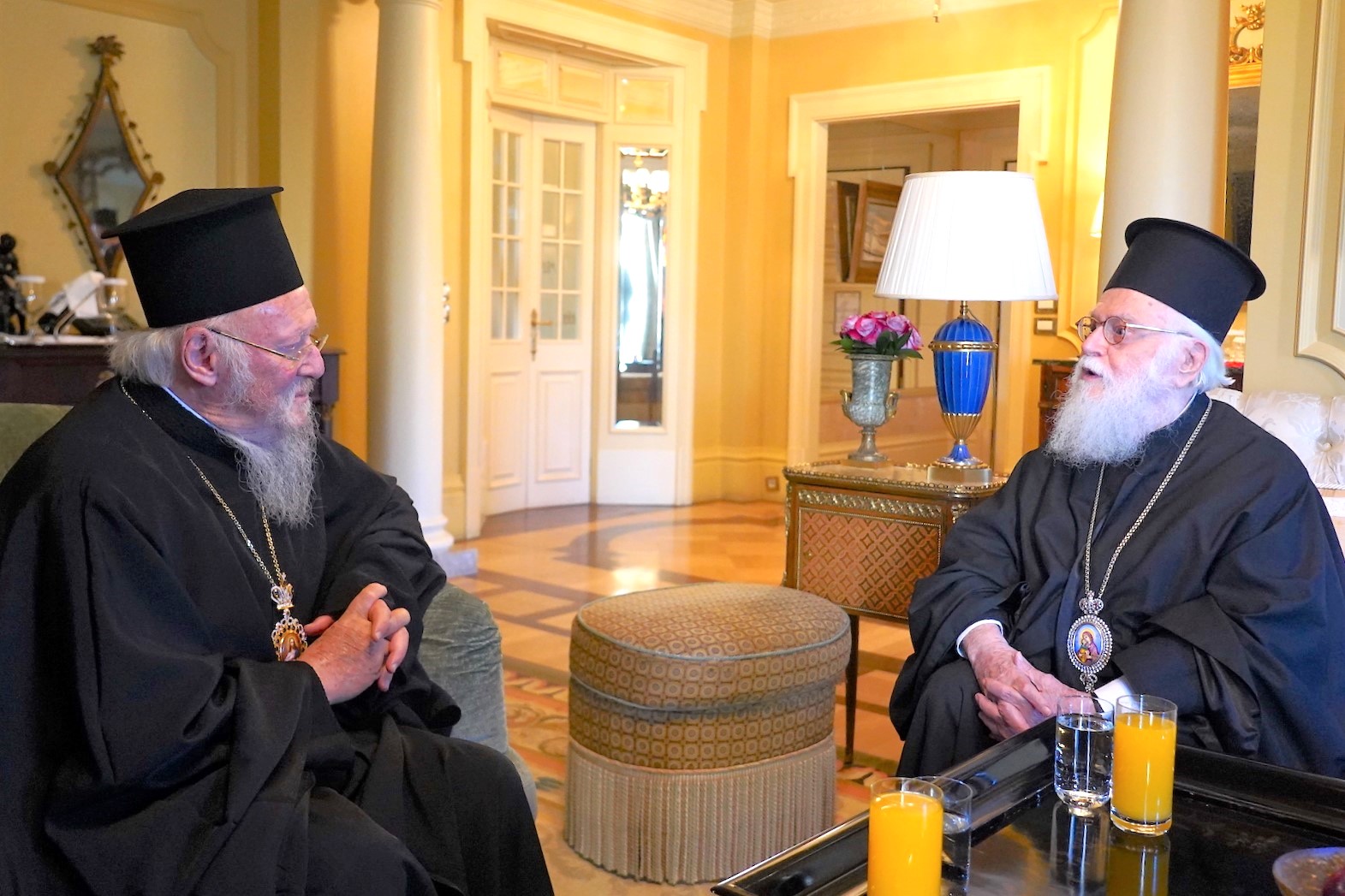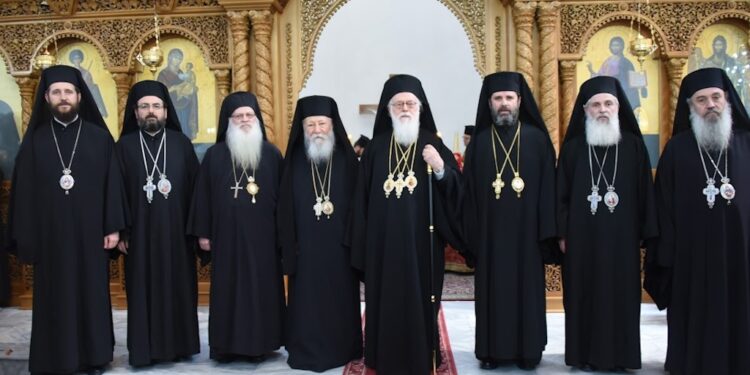Saint Gregory the Theologian, Archbishop of Constantinople (25 January)
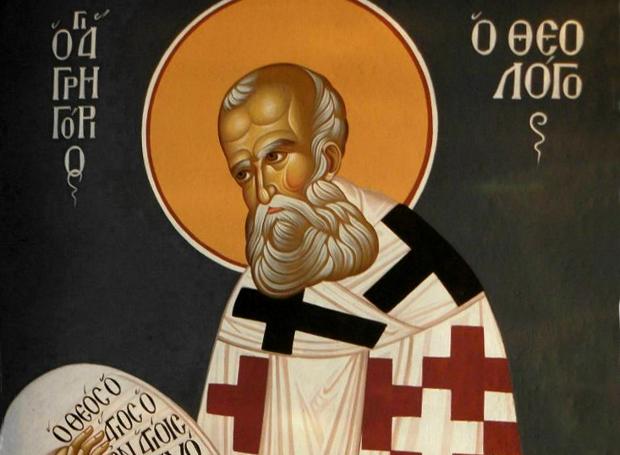

Saint Gregory the Theologian, Archbishop of Constantinople, a great Father and teacher of the Church, was born into a Christian family of eminent lineage in the year 329, at Arianzos (not far from the city of Cappadocian Nazianzos). His father, also named Gregory (January 1), was Bishop of Nazianzus. The son is the Saint Gregory Nazianzus encountered in Patristic theology. His pious mother, Saint Nonna (August 5), prayed to God for a son, vowing to dedicate him to the Lord. Her prayer was answered, and she named her child Gregory.
When the child learned to read, his mother presented him with the Holy Scripture. Saint Gregory received a complete and extensive education: after working at home with his uncle Saint Amphilochius (November 23), an experienced teacher of rhetoric, he then studied in the schools of Nazianzos, Caesarea in Cappadocia, and Alexandria. Then the saint decided to go to Athens to complete his education.
On the way from Alexandria to Greece, a terrible storm raged for many days. Saint Gregory, who was just a catechumen at that time, feared that he would perish in the sea before being cleansed in the waters of Baptism. Saint Gregory lay in the ship’s stern for twenty days, beseeching the merciful God for salvation. He vowed to dedicate himself to God, and was saved when he invoked the name of the Lord.
Saint Gregory spent six years in Athens studying rhetoric, poetry, geometry, and astronomy. His teachers were the renowned pagan rhetoricians Gymorias and Proeresias. Saint Basil, the future Archbishop of Caesarea (January 1) also studied in Athens with Saint Gregory. They were such close friends that they seemed to be one soul in two bodies. Julian, the future emperor (361-363) and apostate from the Christian Faith, was studying philosophy in Athens at the same time.
Upon completing his education, Saint Gregory remained for a certain while at Athens as a teacher of rhetoric. He was also familiar with pagan philosophy and literature.
In 358 Saint Gregory quietly left Athens and returned to his parents at Nazianzus. At thirty-three years of age, he received Baptism from his father, who had been appointed Bishop of Nazianzus. Against his will, Saint Gregory was ordained to the holy priesthood by his father. However, when the elder Gregory wished to make him a bishop, he fled to join his friend Basil in Pontus. Saint Basil had organized a monastery in Pontus and had written to Gregory inviting him to come.
Saint Gregory remained with Saint Basil for several years. When his brother Saint Caesarius (March 9) died, he returned home to help his father administer his diocese. The local church was also in turmoil because of the Arian heresy. Saint Gregory had the difficult task of reconciling the bishop with his flock, who condemned their pastor for signing an ambiguous interpretation of the dogmas of the faith.
Saint Gregory convinced his father of the pernicious nature of Arianism, and strengthened him in Orthodoxy. At this time, Bishop Anthimus, who pretended to be Orthodox but was really a heretic, became Metropolitan of Tyana. Saint Basil had been consecrated as the Archbishop of Caesarea, Cappadocia. Anthimus wished to separate from Saint Basil and to divide the province of Cappadocia.
Saint Basil the Great made Saint Gregory bishop of the city of Sasima, a small town between Caesarea and Tyana. However, Saint Gregory remained at Nazianzos in order to assist his dying father, and he guided the flock of this city for a while after the death of his father in 374.
Upon the death of Patriarch Valentus of Constantinople in the year 378, a council of bishops invited Saint Gregory to help the Church of Constantinople, which at this time was ravaged by heretics. Obtaining the consent of Saint Basil the Great, Saint Gregory came to Constantinople to combat heresy. In the year 379 he began to serve and preach in a small church called “Anastasis” (“Resurrection”). Like David fighting the Philistines with a sling, Saint Gregory battled against impossible odds to defeat false doctrine.
Heretics were in the majority in the capital: Arians, Macedonians, and Appolinarians. The more he preached, the more did the number of heretics decrease, and the number of the Orthodox increased. On the night of Pascha (April 21, 379) when Saint Gregory was baptizing catechumens, a mob of armed heretics burst into the church and cast stones at the Orthodox, killing one bishop and wounding Saint Gregory. But the fortitude and mildness of the saint were his armor, and his words converted many to the Orthodox Church.
Saint Gregory’s literary works (orations, letters, poems) show him as a worthy preacher of the truth of Christ. He had a literary gift, and the saint sought to offer his talent to God the Word: “I offer this gift to my God, I dedicate this gift to Him. Only this remains to me as my treasure. I gave up everything else at the command of the Spirit. I gave all that I had to obtain the pearl of great price. Only in words do I master it, as a servant of the Word. I would never intentionally wish to disdain this wealth. I esteem it, I set value by it, I am comforted by it more than others are comforted by all the treasures of the world. It is the companion of all my life, a good counselor and converser; a guide on the way to Heaven and a fervent co-ascetic.” In order to preach the Word of God properly, the saint carefully prepared and revised his works.
In five sermons, or “Theological Orations,” Saint Gregory first of all defines the characteristics of a theologian, and who may theologize. Only those who are experienced can properly reason about God, those who are successful at contemplation and, most importantly, who are pure in soul and body, and utterly selfless. To reason about God properly is possible only for one who enters into it with fervor and reverence.
Explaining that God has concealed His Essence from mankind, Saint Gregory demonstrates that it is impossible for those in the flesh to view mental objects without a mixture of the corporeal. Talking about God in a positive sense is possible only when we become free from the external impressions of things and from their effects, when our guide, the mind, does not adhere to impure transitory images. Answering the Eunomians, who would presume to grasp God’s Essence through logical speculation, the saint declared that man perceives God when the mind and reason become godlike and divine, i.e. when the image ascends to its Archetype. (Or. 28:17). Furthermore, the example of the Old Testament patriarchs and prophets and also the Apostles has demonstrated, that the Essence of God is incomprehensible for mortal man. Saint Gregory cited the futile sophistry of Eunomios: “God begat the Son either through His will, or contrary to will. If He begat contrary to will, then He underwent constraint. If by His will, then the Son is the Son of His intent.”
Confuting such reasoning, Saint Gregory points out the harm it does to man: “You yourself, who speak so thoughtlessly, were you begotten voluntarily or involuntarily by your father? If involuntarily, then your father was under the sway of some tyrant. Who? You can hardly say it was nature, for nature is tolerant of chastity. If it was voluntarily, then by a few syllables you deprive yourself of your father, for thus you are shown to be the son of Will, and not of your father” (Or. 29:6).
Saint Gregory then turns to Holy Scripture, with particular attention examining a place where it points out the Divine Nature of the Son of God. Saint Gregory’s interpretations of Holy Scripture are devoted to revealing that the divine power of the Savior was actualized even when He assumed an impaired human nature for the salvation of mankind.
The first of Saint Gregory’s Five Theological Orations is devoted to arguments against the Eunomians for their blasphemy of the Holy Spirit. Closely examining everything that is said in the Gospel about the Third Person of the Most Holy Trinity, the saint refutes the heresy of Eunomios, which rejected the divinity of the Holy Spirit. He comes to two fundamental conclusions. First, in reading Holy Scripture, it is necessary to reject blind literalism and to try and understand its spiritual sense. Second, in the Old Testament the Holy Spirit operated in a hidden way. “Now the Spirit Himself dwells among us and makes the manifestation of Himself more certain. It was not safe, as long as they did not acknowledge the divinity of the Father, to proclaim openly that of the Son; and as long as the divinity of the Son was not accepted, they could not, to express it somewhat boldly, impose on us the burden of the Holy Spirit” (Or. 31:26).
The divinity of the Holy Spirit is a sublime subject. “Look at these facts: Christ is born, the Holy Spirit is His Forerunner. Christ is baptized, the Spirit bears witness to this… Christ works miracles, the Spirit accompanies them. Christ ascends, the Spirit takes His place. What great things are there in the idea of God which are not in His power? What titles appertaining to God do not apply also to Him, except for Unbegotten and Begotten? I tremble when I think of such an abundance of titles, and how many Names they blaspheme, those who revolt against the Spirit!” (Or. 31:29).
The Orations of Saint Gregory are not limited only to this topic. He also wrote Panegyrics on Saints, Festal Orations, two invectives against Julian the Apostate, “two pillars, on which the impiety of Julian is indelibly written for posterity,” and various orations on other topics. In all, forty-five of Saint Gregory’s orations have been preserved.
The letters of the saint compare favorably with his best theological works. All of them are clear, yet concise. In his poems as in all things, Saint Gregory focused on Christ. “If the lengthy tracts of the heretics are new Psalters at variance with David, and the pretty verses they honor are like a third testament, then we also shall sing Psalms, and begin to write much and compose poetic meters,” said the saint. Of his poetic gift the saint wrote: “I am an organ of the Lord, and sweetly… do I glorify the King, all a-tremble before Him.”
The fame of the Orthodox preacher spread through East and West. But the saint lived in the capital as though he still lived in the wilderness: “his food was food of the wilderness; his clothing was whatever necessary. He made visitations without pretense, and though in proximity of the court, he sought nothing from the court.”
The saint received a shock when he was ill. One whom he considered as his friend, the philosopher Maximus, was consecrated at Constantinople in Saint Gregory’s place. Struck by the ingratitude of Maximus, the saint decided to resign the cathedral, but his faithful flock restrained him from it. The people threw the usurper out of the city. On November 24, 380 the holy emperor Theodosius arrived in the capital and, in enforcing his decree against the heretics, the main church was returned to the Orthodox, with Saint Gregory making a solemn entrance. An attempt on the life of Saint Gregory was planned, but instead the assassin appeared before the saint with tears of repentance.
At the Second Ecumenical Council in 381, Saint Gregory was chosen as Patriarch of Constantinople. After the death of Patriarch Meletius of Antioch, Saint Gregory presided at the Council. Hoping to reconcile the West with the East, he offered to recognize Paulinus as Patriarch of Antioch.
Those who had acted against Saint Gregory on behalf of Maximus, particularly Egyptian and Macedonian bishops, arrived late for the Council. They did not want to acknowledge the saint as Patriarch of Constantinople, since he was elected in their absence.
Saint Gregory decided to resign his office for the sake of peace in the Church: “Let me be as the Prophet Jonah! I was responsible for the storm, but I would sacrifice myself for the salvation of the ship. Seize me and throw me… I was not happy when I ascended the throne, and gladly would I descend it.”
After telling the emperor of his desire to quit the capital, Saint Gregory appeared again at the Council to deliver a farewell address (Or. 42) asking to be allowed to depart in peace.
Upon his return to his native region, Saint Gregory turned his attention to the incursion of Appolinarian heretics into the flock of Nazianzus, and he established the pious Eulalius there as bishop, while he himself withdrew into the solitude of Arianzos so dear to his heart. The saint, zealous for the truth of Christ, continued to affirm Orthodoxy through his letters and poems, while remaining in the wilderness. He died on January 25, 389, and is honored with the title “Theologian,” also given to the holy Apostle and Evangelist John.
In his works Saint Gregory, like that other Theologian Saint John, directs everything toward the Pre-eternal Word. Saint John of Damascus (December 4), in the first part of his book An Exact Exposition of the Orthodox Faith, followed the lead of Saint Gregory the Theologian.
Saint Gregory was buried at Nazianzos. In the year 950, his holy relics were transferred to Constantinople into the church of the Holy Apostles. Later on, a portion of his relics was transferred to Rome.
In appearance, the saint was of medium height and somewhat pale. He had thick eyebrows, and a short beard. His contemporaries already called the archpastor a saint. The Orthodox Church, honors Saint Gregory as a second Theologian and insightful writer on the Holy Trinity.
This great Father and Teacher of the Church was born in 329 in Arianzus, a village of the second district of Cappadocia, not far from Nazianzus. His father, who later became Bishop of Nazianzus, was named Gregory (commemorated Jan. 1), and his mother was named Nonna (Aug. 5); both are among the Saints, and so are his brother Caesarius (Mar. 9) and his sister Gorgona (Feb. 23). At first he studied in Caesarea of Palestine, then in Alexandria, and finally in Athens. As he was sailing from Alexandria to Athens, a violent sea storm put in peril not only his life but also his salvation, since he had not yet been baptized. With tears and fervour he besought God to spare him, vowing to dedicate his whole self to Him, and the tempest gave way to calm. At Athens Saint Gregory was later joined by Saint Basil the Great, whom he already knew; but now their acquaintanceship grew into a lifelong brotherly love. Another fellow student of theirs in Athens was the young Prince Julian, who later as Emperor was called the Apostate because he denied Christ and did all in his power to restore paganism. Even in Athens, before Julian had thrown off the mask of piety; Saint Gregory saw what an unsettled mind he had, and said, “What an evil the Roman State is nourishing” (Orat. V, 24, PG 35:693).
After their studies at Athens, Gregory became Basil’s fellow ascetic, living the monastic life together with him for a time in the hermitages of Pontus. His father ordained him presbyter of the Church of Nazianzus, and Saint Basil consecrated him Bishop of Sasima (or Zansima), which was in the archdiocese of Caesarea. This consecration was a source of great sorrow to Gregory, and a cause of misunderstanding between him and Basil; but his love for Basil remained unchanged, as can be plainly seen from his Funeral Oration on Saint Basil (Orat. XLIII).
About the Year 379, Saint Gregory came to the assistance of the Church of Constantinople, which had already been troubled for forty years by the Arians; by his supremely wise words and many labours he freed it from the corruption of heresy, and was elected Archbishop of that city by the Second Ecumenical Council, which assembled there in 381, and condemned Macedonius, Archbishop of Constantinople, the enemy of the Holy Spirit. When Saint Gregory came to Constantinople, the Arians had taken all the churches and he was forced to serve in a house chapel dedicated to Saint Anastasia the Martyr. From there he began to preach his famous five sermons on the Trinity, called the Triadica. When he left Constantinople two years later, the Arians did not have one church left to them in the city. Saint Meletius of Antioch (see Feb. 12), who was presiding over the Second Ecumenical Council, died in the course of it, and Saint Gregory was chosen in his stead; there he distinguished himself in his expositions of dogmatic theology.
Having governed the Church until 382, he delivered his farewell speech – the Syntacterion, in which he demonstrated the Divinity of the Son – before 150 bishops and the Emperor Theodosius the Great; in this speech he requested, and received from all, permission to retire from the see of Constantinople. He returned to Nazianzus, where he lived to the end of his life, and reposed in the Lord in 391, having lived some sixty-two years.
His extant writings, both prose and poems in every type of metre, demonstrate his lofty eloquence and his wondrous breadth of learning. In the beauty of his writings, he is considered to have surpassed the Greek writers of antiquity, and because of his God-inspired theological thought, he received the surname “Theologian.” Although he is sometimes called Gregory of Nazianzus, this title belongs properly to his father; he himself is known by the Church only as Gregory the Theologian. He is especially called “Trinitarian Theologian,” since in virtually every homily he refers to the Trinity and the one essence and nature of the Godhead. Hence, Alexius Anthorus dedicated the following verses to him:
Like an unwandering star beaming with splendour,
Thou bringest us by mystic teachings, O Father,
To the Trinity’s sunlike illumination,
O mouth breathing with fire, Gregory most mighty.
Gregory was born in Nazianzus of a Greek father [who later became a Christian and a bishop] and a Christian mother. Before his baptism, he studied in Athens with Basil the Great and Julian the Apostate. Gregory often prophesied that Julian would become an apostate and a persecutor of the Church, and this actually happened. Gregory’s good mother, Nonna, had an especially great influence on him. When he had completed his studies Gregory was baptized. St. Basil consecrated him as Bishop of Sasima, and Emperor Theodosius the Great summoned him to fill the vacant archepiscopal throne of Constantinople. He wrote numerous works, the most famous of which are those on theology, for which he is called The Theologian. Especially known, because of its depth, is his work Homilies on The Holy Trinity.
Gregory wrote against the heretic Macedonius, who erroneously taught that the Holy Spirit is a creation of God. He also wrote against Apollinarius, who erroneously taught that Christ did not have a human soul, but that His divinity was in lieu of His soul. Additionally Gregory wrote against Emperor Julian the Apostate, his one-time fellow student. In 381 A.D., when a debate began regarding his election as archbishop, he withdrew on his own and issued a statement: “Those who deprive us of our archepiscopal throne cannot deprive us of God.” Afterward he left Constantinople and went to Nazianzus, and there he lived a life of solitude and prayer, writing beneficial books. Although he was in poor health throughout his entire life, Gregory nevertheless lived to be eighty years old. His relics were later transferred to Rome. A reliquary containing his head reposes in the Cathedral of the Dormition in Moscow. He was, and remains, a great and wonderful light of the Orthodox Church, as much by his meekness and purity of character as by the unsurpassable depth of his mind. He reposed in the Lord in the year 390 A.D.
Apolytikion of Gregory the Theologian
First Tone
The pastoral flute of your theology conquered the trumpets of orators. For it called upon the depths of the Spirit and you were enriched with the beauty of words. Intercede to Christ our God, O Father Gregory, that our souls may be saved.
Kontakion of Gregory the Theologian
Third Tone
O Glorious One, you dispelled the complexities of orators with the words of your theology. You have adorned the Church with the vesture of Orthodoxy woven from on high. Clothed in this, the Church now cries out to your children, with us, “Hail Father, the consummate theological mind.”
Source: oca.org / goarch.org / westserbdio.org

